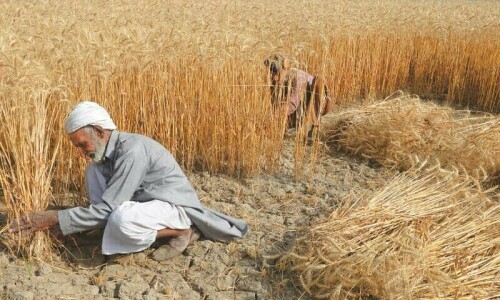KARACHI, Oct 30: Sindh Chief Minister Dr Arbab Rahim lashed out on Tuesday on what he called some “vested interests” in the federal government who, he said, were obstructing the plan for gainful exploitation of the huge coal reserves in Thar for producing electricity.
He accused such elements of thwarting President Pervez Musharraf’s efforts to make use of the coal reserves for generating electricity. The president, he said, had visualised 30 per cent energy generation from coal by the year 2010.
He demanded an ‘upfront tariff’ reasonable enough to encourage investment in the sector. The chief minister was inaugurating a two-day international symposium on ‘Sindh coal (lignite) mining: challenges and success’ being attended by a large number of experts from Pakistan and abroad.
Dr Arbab Rahim’s harsh remarks against the ‘vested interests’ in the federal government came only two to three weeks before he is to quit the Chief Minister House to make way for his caretaker successor. The remarks appeared to be directed at Liaquat Jatoi, a former chief minister of Sindh and now the federal minister of water and power.
Dr Arbab ridiculed the ‘hackneyed negative approach’ of the federal government under which “they are prepared to offer over 13 cents on furnace oil, 10 to 12 cents for wind but are not willing to accept 7 to 9.5 cents for coal”.
He also criticised some decisions of federal institutions which “undermined our efforts to set up power plants on imported coal”.
The price of imported coal fluctuates and keeps on changing. For over 13 years, the people of Thar, Sindh and Pakistan have waited for gainful exploitation of Sindh coal to generate energy and bring prosperity and progress.
He said the ‘sad experiences’ at Lakhra, the LCDC and efforts to set up coal-fired power plans ‘are not very encouraging’. He recalled how an offer by Chinese investor Shenhua was not grasped and said that the continuation of a rigid power policy made him believe that “there are vested interests” who appeared to be determined to thwart President Musharraf’s plan to harness coal energy.
“Coal is a provincial subject and we are its custodians,” the chief minister declared in a tone which appeared to be a blunt message to the task force set up by the federal government.
He recalled that way back in 2004, Chinese investors had asked the Private Power Investment Board (PPIB) about a number of projects being set up under the power policy. The answer was that no project was being set up and since then “we have not moved forward”. It was, therefore, imperative to ‘review and revise’ the power policy that had become an impediment to progress, he said.
Dr Arbab said he had signed memoranda of understanding with several companies but no progress could be made because of the obstructions.
Dr Arbab said the experience had been frustrating for him because his government had invested Rs3 billion on development of infrastructure in Thar. The idea was to make Thar attractive to investors. “Today even the remotest corner of Nagarparkar is directly linked with Karachi”, he said.
He announced that over 20 reverse osmosis units would become functional to provide clean drinking water to the people of Thar.
Earlier, Sindh Minister of Mines and Mineral Development Irfan Marwat called for an upfront tariff for electricity generated by coal-fired power stations so that investors could have an idea of return on their investment. He said that oil prices exceeding 92 dollars a barrel were making the cost of electricity produced by fuel-powered plants prohibitive.
The minister said that Poland and several other European countries were generating electricity from coal which is also being exported.
Abdul Rashid Khan, Chairman of National Energy Power Regulatory Authority, in a presentation explained the tariff formula worked out for Wapda, KESC and private power projects.
The vice president of the Federation of Pakistan Chambers of Commerce and Industry, Farooq Dadabhoy, in his speech stressed the need for investing in gainful exploitation of indigenous resources.














































Dear visitor, the comments section is undergoing an overhaul and will return soon.